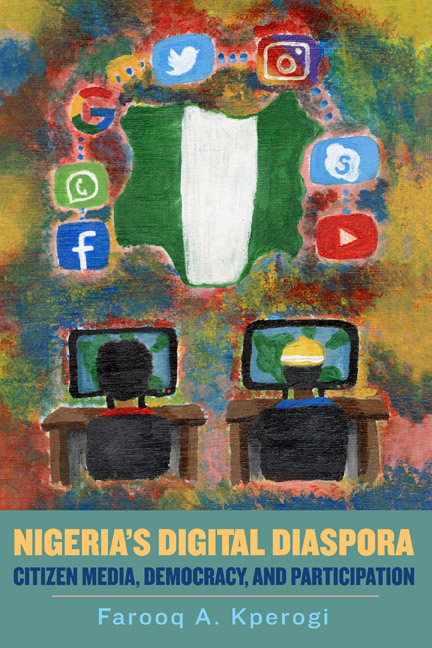Book contents
- Frontmatter
- Dedication
- Contents
- Acknowledgments
- Introduction
- 1 Citizen and Alternative Journalism: Mapping the Conceptual Contours
- 2 The Nigerian Press: From Colonial Evangelism to Guerrilla Journalism
- 3 The Nigerian Digital Diasporic Public Sphere
- 4 Profiles of Diasporic Citizen Media Sites
- 5 From the Diaspora to the Homeland: Role Reversal in News Flows
- 6 The Nigerian Government’s Response to the Diasporic Citizen Media
- 7 Domestic Online Media, Social Networked Journalism, and Participation
- 8 Mainstreaming of Diasporic Citizen Journalism and Implications for Nigerian Journalism
- Notes
- Bibliography
- Index
5 - From the Diaspora to the Homeland: Role Reversal in News Flows
Published online by Cambridge University Press: 13 April 2021
- Frontmatter
- Dedication
- Contents
- Acknowledgments
- Introduction
- 1 Citizen and Alternative Journalism: Mapping the Conceptual Contours
- 2 The Nigerian Press: From Colonial Evangelism to Guerrilla Journalism
- 3 The Nigerian Digital Diasporic Public Sphere
- 4 Profiles of Diasporic Citizen Media Sites
- 5 From the Diaspora to the Homeland: Role Reversal in News Flows
- 6 The Nigerian Government’s Response to the Diasporic Citizen Media
- 7 Domestic Online Media, Social Networked Journalism, and Participation
- 8 Mainstreaming of Diasporic Citizen Journalism and Implications for Nigerian Journalism
- Notes
- Bibliography
- Index
Summary
The online media of the Nigerian diaspora, as has been adverted to in previous chapters, have competed favorably with, and in some cases actually superseded, the homeland media in charting the course of far-reaching national discourses and in confronting and exposing corruption both in government and in the media. Chapter 4 illustrated some of the ways in which the diasporic news media exposed high-level corruption among the Nigerian domestic ruling elite, although some of the diasporic media are themselves not always immune from the ills they have railed against. This chapter highlights and discusses more case studies that instantiate the everrising significance of the Nigerian diasporic online citizen media formation. It shows that in addition to being consequential enough to cause governmental policy changes, the diasporic citizen media have also exposed corruption in the Nigerian press and thereby weakened the legitimacy of a hitherto vibrant but now thoroughly compromised traditional national media establishment.
The case studies in this chapter are organized and thematized as follows: cases where diasporic online citizen media stories led to homeland governmental policy changes and cases where the diasporic online media exposed high-level corruption in the local media. All case studies selected for this chapter have had momentous consequences in the domestic public sphere and are likely to define the form and substance of the relational dynamics between the Nigerian diasporic online citizen media formation and the traditional media and politics of the domestic public sphere in the foreseeable future. How the diasporic citizen media chose to report on the cases highlighted in this chapter will enrich and complicate the extant literature on the modalities and singularities of citizen reporting and illustrate how what Deborah Chung and her colleagues called a “form of amateur journalism” is challenging the role of traditional journalism in a transnational setting.
How Diasporic Citizen Media Reporting Caused Governmental Policy Reversals
One dramatic case that exemplifies the power of the Nigerian diasporic online media to compel homeland government to reverse policy decisions was the controversy over a proposed “capacity-building” training for Nigeria's state governors at Harvard University.
- Type
- Chapter
- Information
- Nigeria's Digital DiasporaCitizen Media, Democracy, and Participation, pp. 113 - 134Publisher: Boydell & BrewerPrint publication year: 2020



